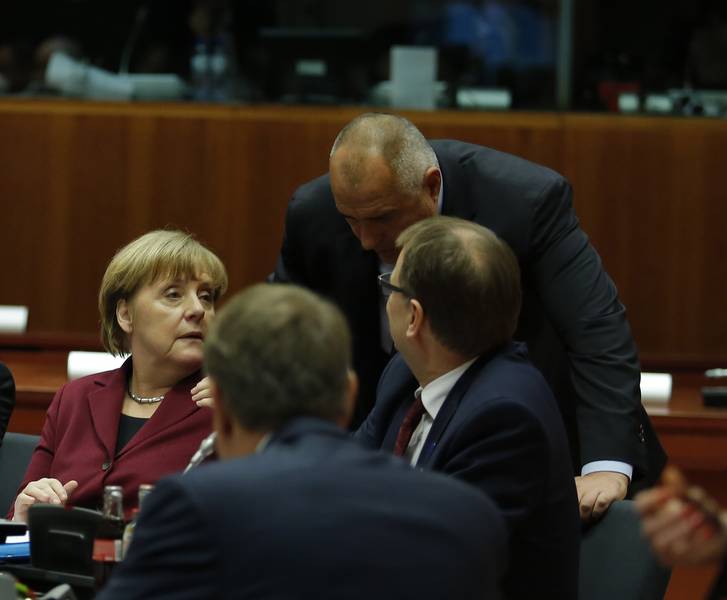Boyko Borissov Hopes European Commission Will Lift Its Monitoring Next Year
Adelina Marini, December 16, 2016
 This article was supposed to have a different headline: “The European Commission removes its monitoring off Bulgaria next year”, but it was true for just a few minutes until one of the mysteries in Brussels on Thursday got revealed. Around lunchtime on December 15, it became known that resigned Prime Minister Boyko Borissov had a meeting with the First Vice-President of the European Commission Frans Timmermans (The Netherlands, Socialists and Democrats), who is responsible for the rule of law and fundamental rights. He is the right hand man of EC President Jean-Claude Juncker (Luxembourg, EPP). The meeting lasted unexpectedly long and was the reason behind Mr Borissov being late for the opening of the December European Council. Him being late was the formal reason for the PM’s refusal to speak to journalists before the start of the summit. Later, however, a curious drama unfolded.
This article was supposed to have a different headline: “The European Commission removes its monitoring off Bulgaria next year”, but it was true for just a few minutes until one of the mysteries in Brussels on Thursday got revealed. Around lunchtime on December 15, it became known that resigned Prime Minister Boyko Borissov had a meeting with the First Vice-President of the European Commission Frans Timmermans (The Netherlands, Socialists and Democrats), who is responsible for the rule of law and fundamental rights. He is the right hand man of EC President Jean-Claude Juncker (Luxembourg, EPP). The meeting lasted unexpectedly long and was the reason behind Mr Borissov being late for the opening of the December European Council. Him being late was the formal reason for the PM’s refusal to speak to journalists before the start of the summit. Later, however, a curious drama unfolded.
It turned out that the PM did not want to speak before Mr Timmermans’ office came out with an official statement. This did a lot to heighten the curiosity of journalists in Brussels about the content of the conversation. According to well informed sources, the topic of the conversation was the Cooperation and Verification Mechanism (CVM) under which Bulgaria and Romania joined the EU on January 1st of 2007, and whose function it is to watch whether Bulgaria is implementing the expected reform of the justice system and whether it is leading a battle against corruption and organised crime. The lack of progress on the benchmarks set almost ten years ago now was the reason for having a veto imposed on Bulgaria joining Schengen.
After a long wait, Mr Timmermans’ statement about the meeting finally came out, but instead of clarity it only brought more confusion. “Today I had a good meeting with PM Borissov to discuss progress made in implementing CVM benchmarks ahead of our CVM report to be presented in January. I commended the PM for his efforts in reforming the Bulgarian judicial system and his strong commitment in stepping up the fight against corruption in Bulgaria. I encouraged him to continue this fight and show the results, such as more cases of specialised prosecution. PM Borissov informed me about the impressive results his government has achieved in fighting smuggling in the last two years, which lead to approximately 2 billion euro of extra tax income”, says the official statement.
The prime minister has resigned and the last thing that could be said about his government is success in the judicial reform, let alone talk about a stepped up fight against corruption. Such kind words, however, would give him serious aid on the domestic political stage. This was clearly demonstrated in PM Borissov’s statement later on. The PM claims that the meeting was initiated by the first vice president, but one of euinside’s sources disproved that and announced that the meeting was requested by the prime minister. “I would like to first of all thank Vice President Timmermans – I was not even expecting this meeting. He had expressed his wish to discuss this topic, on which Mrs Zaharieva [the justice minister] already met with him on this subject. Despite us being from different political families, I did not expect such flattering attitude, such high appraisal of our work, especially in the fight against smuggling and the budget revenues”, said Mr Borissov.
He said that he did not expect Frans Timmermans’ office coming out with an official statement. In his words, during the meeting, Mr Timmermans told him that if he continued in the same fashion with the reforms the monitoring mechanism could be lifted as early as next year. What is more, it is expected that Timmermans will visit Bulgaria in February, regardless of the government having resigned. The aim of the visit, according to Boyko Borissov, is to explain to the Bulgarian public what the role of his government is and all that has been done during its term. This caused instant furore among journalists, for whom it this was breaking news. “I did not even expect that you will learn of this meeting because before the Council I thought that he wanted to ask me about the political situation and whatnot, so that I would not presume to talk on his behalf. An extremely serious person and it even surprised me that he would wish to issue a press release”, continued Mr Borissov.
He clarified that talk is of the full abolishment of the mechanism and exchanging it for the common European mechanism for the rule of law, under which the EC has currently opened a procedure against Poland, with no apparent success. In order for the mechanism to be removed, the EC needs to make a proposal which then needs to be approved by the Council of Ministers. Boyko Borissov expressed confidence that he has his colleagues’ support for this. He announced that even at the EU summit he discussed the subject with Chancellor Angela Merkel and “everyone who is a factor”. Regarding the veto by The Netherlands against Bulgaria joining Schengen because of not implementation of benchmarks under the CVM, Boyko Borissov commented that The Netherlands did the same  blocking towards the Ukraine. “We imposed sanctions on Russia because of the Ukraine, The Netherlands stopped the visas for the Ukraine. And we all gave up".
blocking towards the Ukraine. “We imposed sanctions on Russia because of the Ukraine, The Netherlands stopped the visas for the Ukraine. And we all gave up".
Actually word is not of visas for the Ukraine, but the comprehensive trade agreement, which was ratified by all EU member states, except The Netherlands which subjected the agreement to a referendum in the spring and it got discarded. Finding a solution to the so created crisis situation was one of the important topics at the December summit. Ultimately, an agreement was reached. It is expressly stated in it that it does not mean that the Ukraine has gained an EU candidate state status, neither is it any commitment Ukraine should gain any such status at any point in the future.
It is also pointed out that the part of the comprehensive agreement for cooperation in the area of defence does not obligate the EU or any of its members to provide collective guarantees for Ukraine’s security. Moreover, the agreement does not grant Ukrainian nationals the right to mobility within the EU. It does not promise financial aid for Ukraine’s reforms.
Obviously, becoming aware that his words were already typing the first page headlines for the lifting of the CVM, Prime Minister Borissov asked us journalists to be very careful in conveying his words and keep to Frans Timmermans' statement. The EC report on the CVM will be published on January 25. Due to the upcoming Bulgarian Presidency of the Council of the EU in the beginning of 2018, the EC is expected to publish two reports next year. Besides the one on January 25, there will be another one in the end of 2017 to avoid the humiliation of the country, which presides the Council of Ministers being under the Commission’s monitoring. A thing, which happened to Greece and Cyprus while they were under bailout programmes during their presidencies.
The full statement of the resigned Prime Minister can be seen here
Translated by Stanimir Stoev
 Entrance to the Berlaymont building | © EC - Audiovisual Service
Entrance to the Berlaymont building | © EC - Audiovisual Service | © European Union 2020, EC - Audiovisual Service
| © European Union 2020, EC - Audiovisual Service Commission President Ursula von der Leyen | © European Union 2019 - Source: EP
Commission President Ursula von der Leyen | © European Union 2019 - Source: EP